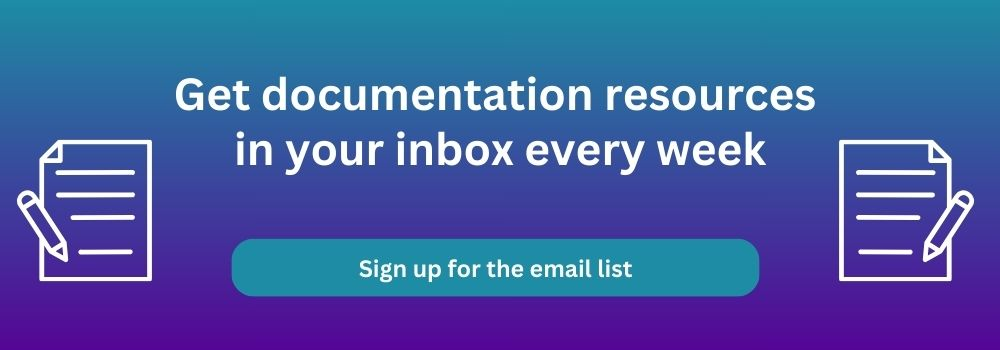After you're familiar with the answer to "What is Documentation?" the next question you may ask is, "Why is documentation important?" Though we discussed the importance of process documentation briefly in the previous blog, we'll expand on it here with the help of additional contributors.
Expert contributors in this article:
- Chris Grant, Consultant at BabelQuest
- Hannah Fisher, Consultant at BabelQuest
- Ashley Rudolph, Founder of Work with Ashley R
- Kristen Kelly, Director of Operations at Proofpoint Marketing
- Randi-Sue "Randi" Deckard, SVP, Client Engagement at BESLER
- Adam Stahl, Solutions Architect and HubSpot Certified Trainer at Media Junction
With this mix of agency expertise, consulting and coaching experience, and deep knowledge across sales, service, and customer teams in a variety of industries, their combined wisdom will provide you with a well-rounded viewpoint on the different ways that documentation is important.
The topics in this blog include:
- The main reasons why documentation is important
- Personal / Individual reasons why documentation is important
- Company-level reasons why documentation is important
In this article, you may notice employee onboarding mentioned several times. I added a few specific onboarding questions into this contributor survey, to help with preliminary research for my next courses about building employee onboarding programs. Sign up here to be included in future surveys to help decide what's included in the courses!
The main reasons why documentation is important
Why is documentation important?
A few of the top reasons are:
- Saving time from errors, risks, or recreating the wheel, while ensuring quality control
- Enabling clear communication, accountability, and empowering team members to complete new tasks
- Consistency in process execution between current team members and after someone leaves the company
- Improvement is possible for processes, and that change is easier for your team
- Profitability!
When asked about documentation's importance, Chris Grant said, "Businesses evolve almost constantly, technology changes and people come and go. Process documentation is often the only constant and without it, teams will waste hours doing the wrong thing or reinventing the wheel." Documentation's importance in change management cannot be under stressed.
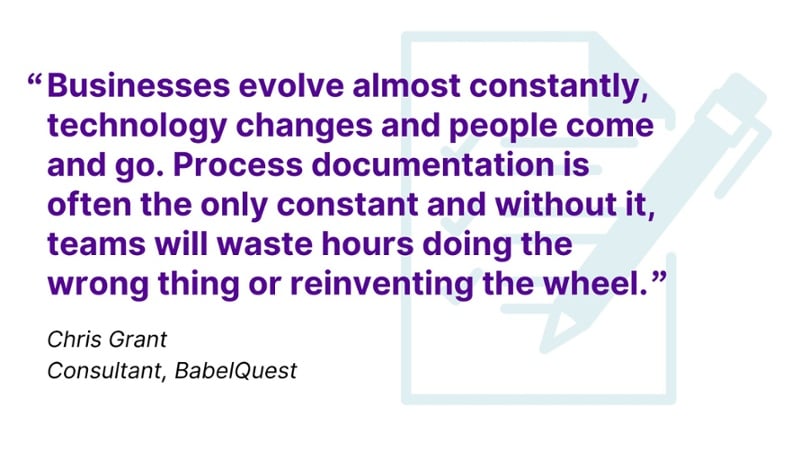
Randi-Sue Deckard's healthcare background provides a different lens on the importance of good documentation. "Coming from the clinical side of care, if it wasn't documented, it didn't happen. I was surprised, as I moved from the clinical to the commercial side of healthcare, that documentation wasn't enforced," she said.
Randi gave these reasons for why documentation is important:
- "Ensures consistency in delivery (quality).
- Clarifies who is accountable for doing what and when.
- Helps train or onboard new employees with standard guidelines.
- Reduces risk by adhering to policies/regulations especially if there are state/government/agency requirements.
- {Enables} process improvement through iterations of the process documentation steps based on feedback and unexpected outcomes."
Kristen Kelly explained how documentation helped her agency in the previous blog, and added, "Documentation saves time, ensures consistent and quality work, fosters profitability, and identifies areas for optimization." Four excellent reasons why documentation is essential for any business.
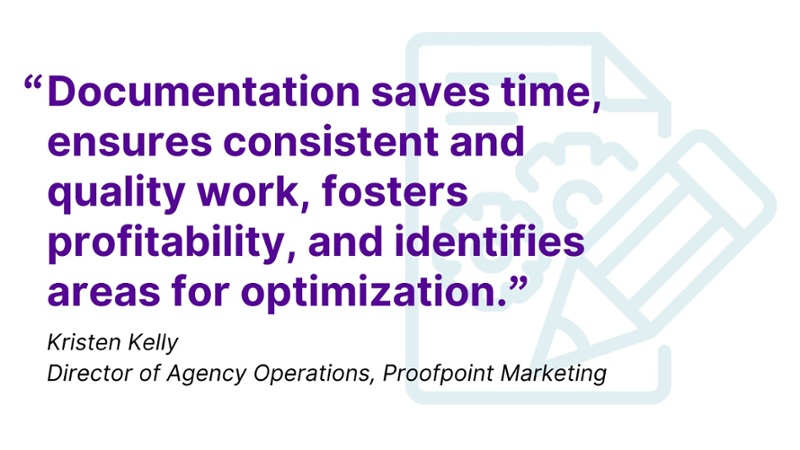
Adam Stahl adds to the consistency theme with thoughts about sharing information and increasing the confidence of team members to try new tasks. "Business process documentation is crucial for a multitude of reasons. Much like writing down the recipe for a beloved family dish that has been handed down for generations, it ensures that your business has the steps and list of figurative ingredients to make that magic outcome happen the same way each time you go to make it. It also helps de-silo information and empowers others to act in areas they may not typically find themselves contributing to when a need arises," he said.
Hannah Fisher provided a beautifully clear and structured response to why documentation is important:
"Clear Communication:
- Why? So everyone knows what they're supposed to do.
- How? Write down how things get done, so it's crystal clear.
Consistency Rules:
- Why? Keep quality in check and follow the rules.
- How? Stick to the documented way of doing things every time.
Get Better Every Day:
- Why? Find and fix what's not working.
- How? Look at your documented processes, spot the problems, and make them better.
Stay Out of Trouble:
- Why? Avoid risks and be prepared for surprises.
- How? Know your weaknesses, document them, and have a plan to handle trouble.
Roll with the Changes:
- Why? Things change, and you need to keep up.
- How? Document what you do now so it's easier to change things later.
Pass It On:
- Why? Don't lose what you know when someone leaves.
- How? Write down how things are done, so others can pick up where you left off.
In a nutshell, documenting your business processes keeps everyone on the same page, helps you improve, avoids problems, handles changes smoothly, and makes sure the good stuff sticks around even when people move on."
Though the experts have thoroughly answered the question, if you're still not convinced of the power of documentation, check out this blog to see more reasons why documentation is important for different jobs.
Quora also has 64 different responses to answer why documentation is necessary.
Is there one reason or purpose above all other reasons that documentation is important?
The short version of the answers for the top reasons why documentation is important:
- Consistency
- Clarity or transparency
- Equal information access for the team
- Quality
- Efficiency
- Optimization
As a human-centered operations leader, let's start with Kristen's answer about documentation as part of a people-first culture. She said, "Documentation provides an equal and universal knowledge base. This is especially critical for remote, distributed, flexible companies where it's necessary for everyone to have access to information regardless of the time zone."
Hannah talked about another people and process benefit as the number one reason why documentation is important. "The most crucial thing about business process documentation is making sure everyone knows what's going on. When you're crystal clear about how things work, everything else—like keeping things consistent, getting better, handling changes, and avoiding problems—falls into place. So, clarity is the key to business process documentation!"
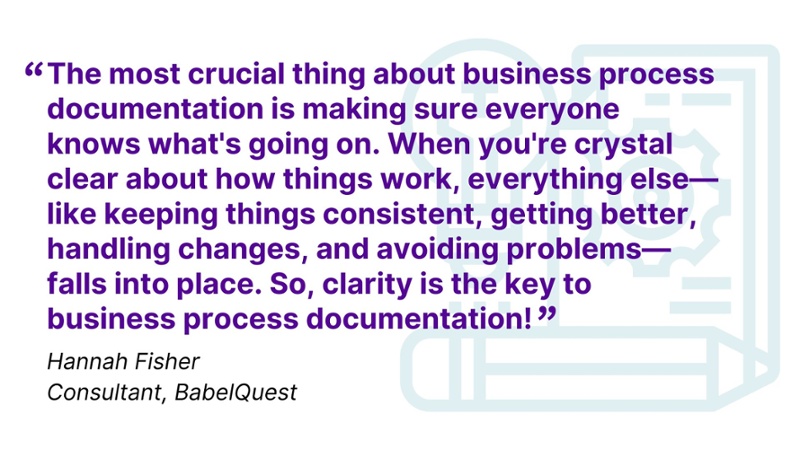
If you've been reading and learning about operations, you've likely come across the word 'alignment' many times. This people-related goal is often the number one problem operations is trying to solve. Chris explained how this makes consistency the most important benefit of documentation. "Following a consistent process drives alignment within your organization and provides the right experience for your customers. Everyone knows what they should be doing and which data points are the important ones," he said.
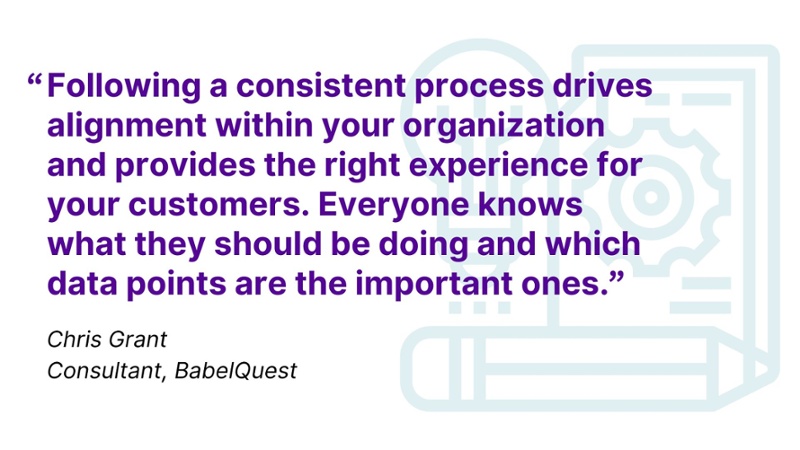
Randi explained several top reasons why documentation is important. "Having standardized processes that everyone follows is critical for consistency, quality, and to ensure the organization is efficient (no duplicative or wasted efforts)," she said.
Optimization and scaling processes are the top benefits that Adam discussed. "It’s difficult to measure, scale, and optimize something that you can’t readily review. The exercise of documenting - getting knowledge and insights out of people’s minds and onto paper - is the catalyst for the many benefits of documentation," he said.
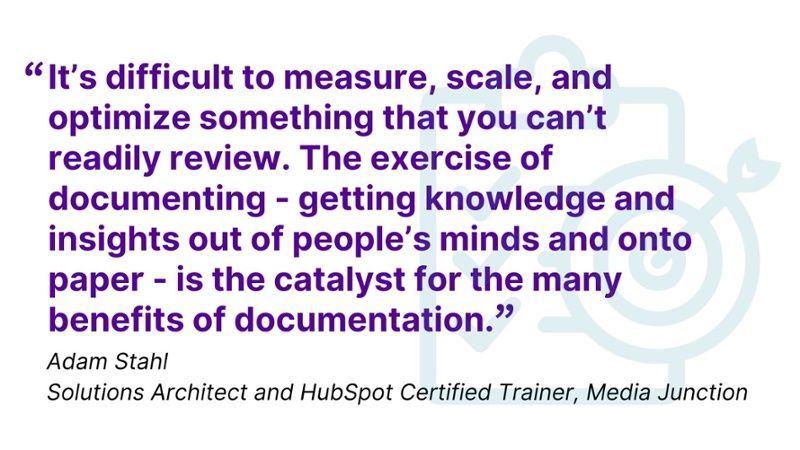
A related question on the contributor survey asked about the most important process to document.
Chris said the process of "Stranger to lead to customer to repeat customer - this is the reason you are in business and the central process which connects all your other business processes."
Hannah said, "Documenting processes that are at the core of your business operations ensures that the fundamental tasks and workflows are well-understood and consistently executed."
This video from Trainual described efficiency as the top reason why documentation is important, and Stratecta Management Consultancy describes some of the reasons above in greater detail.
What happens when you don’t have process documentation?
The top ten consequences of NOT having documentation:
- Chaos
- Confusion
- Miscommunication
- Reduced efficiency, reactivity, recreating the wheel
- Inconsistency, quality issues, poor output
- Knowledge loss of business-critical information
- Training and improvement difficulties
- Reduced profit margin
- Change resistance
- Increased risk
Chris gave the succinct and clear answer of: "Chaos."
A similar answer started Hannah's response, who gave us another helpful bulleted list, which would be a great addition to any company's documentation about documentation.
"Confusion and Miscommunication:
- Individual: You might not be sure how to perform tasks, leading to confusion.
- Company: Team members may misunderstand their roles, causing miscommunication and errors in workflow.
Inconsistency:
- Individual: Your approach to tasks might change frequently, causing inconsistency.
- Company: Without set processes, different teams or individuals may handle tasks differently, leading to inconsistencies in outputs.
Training Challenges:
- Individual: It becomes harder for new team members to learn and adapt.
- Company: Training new employees becomes time-consuming and less effective without documented processes.
Quality Issues:
- Individual: Your work might lack consistency and quality.
- Company: Without standardized processes, maintaining a high level of quality across products or services becomes challenging.
Difficulty in Improvement:
- Individual: Identifying and fixing inefficiencies becomes tough.
- Company: Continuous improvement is hindered as there's no baseline for identifying and addressing weaknesses in processes.
Increased Risk:
- Individual: You might be more prone to errors or overlook critical steps.
- Company: Lack of documented processes increases the risk of compliance issues, mistakes, and operational disruptions.
Resistance to Change:
- Individual: Adapting to changes in your work becomes more challenging.
- Company: Implementing changes in the organization is met with resistance as there's no established baseline for comparison.
Knowledge Loss:
- Individual: Your unique knowledge might be lost when you're not around.
- Company: Critical institutional knowledge is at risk of being lost during employee turnover."
Ashley Rudolph explained how a lack of documentation causes the nemesis of efficiency: recreating the wheel. "Without documentation, you create a culture where reactivity becomes the norm. When well-designed and efficient processes aren’t developed and documented, then teams often end up solving the same problems and recreating solutions — a waste of human capital and company resources," she said.
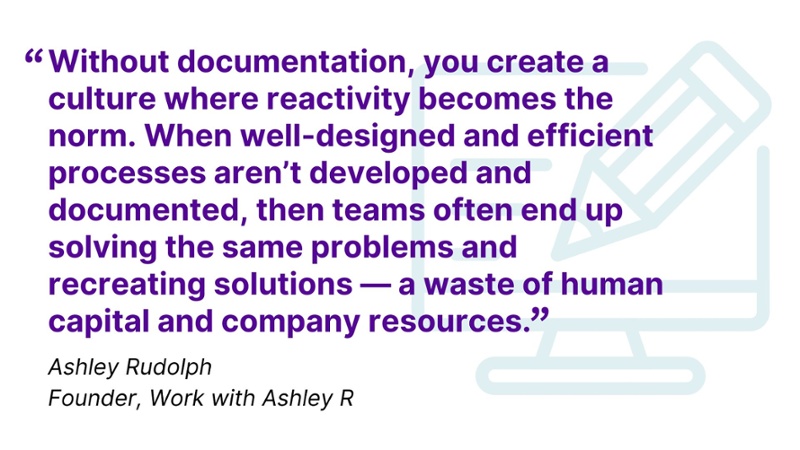
Kristen provided a clear list of the bad things that happen when you don't have documentation.
"Without process documentation:
- Efficiency is reduced: Teammates spend valuable time seeking out answers to questions or instructions, rather than being able to dive into the work.
- Output suffers: Without a consistent process, work is delivered with inconsistencies or misalignment.
- Profit margin shrinks: Documentation enables teammates to follow a process that is proven to take a finite range of time. Without it, effort compounds and efficiencies that allow for greater utilization diminish.
- You can't manage what you can't measure: Without documentation, it's hard to know if a process is efficient or profitable."
Randi explained how one issue caused by not having documentation can cascade into many other issues. "[It] leads to confusion (who's doing what) and quality issues (no standardized method) which can impact efficiency and ultimately profitability."
Adam stressed the consequences of those 'knowledge-holders' leaving the company or being unavailable at certain times. "When you don’t have processes documented, you risk the loss of business-critical knowledge and insights. For example, if your process for a business-critical function is a person - if someone at your organization were to ask how a process worked and the answer is essentially “talk to Jen, she’s the one that knows all about that” - that information is locked to that person. If that person were to be unavailable or were to transition out of a department, team, or even your organization, that business-critical process then goes with them in the absence of documentation," he said.
For more consequences, see Guidde's blog that explains the 21% loss in productivity resulting from a lack of documentation, and ZenPilot's explanation of the consequences of an agency with no documented processes.
Why don't more companies have their processes documented?
The experts gave these top ten reasons why the importance of documentation is often overlooked:
- Time for creation, resource constraints
- Lack of urgency
- Intimidation and change resistance
- Internal conflict/misalignment
- Responsibility is unclear, no accountability
- Maintenance time and processes are needed to instill trust
- Assuming everyone has implicit knowledge
- Focus on short-term goals over long-term benefits
- Overemphasis on technology as the answer to every problem
- Value is not communicated, the costs of not having it, or its impact on revenue
Randi explained that most companies don't document their processes because it is time-consuming to initiate and keep up with.
Hannah's response also emphasized time as a primary reason why documentation isn't created. "The importance of documentation is frequently overlooked in many companies due to factors such as time constraints, a perceived lack of urgency, the assumption of implicit knowledge, resource constraints, and a focus on short-term goals. Resistance to change, a lack of awareness regarding the benefits of documentation, misconceptions about its complexity, high turnover rates, and an overemphasis on technology can also contribute to the absence of well-documented processes," she said.
Hannah continued, "Organizations often fail to see the immediate benefits of documentation, and in industries with transient workforces, the perceived value of investing in comprehensive documentation may be diminished. Overcoming these challenges requires a shift in mindset, recognizing the long-term advantages of documentation, fostering a culture that values it, and allocating resources appropriately, ultimately contributing to improved operational efficiency and resilience."
The value of documentation, the benefits described earlier in this blog, are rarely communicated well within an organization. Ashley explained that some environments underestimate the value of documentation, "viewing it as busy work and a waste of team bandwidth. They favor other more pressing tasks over things like documentation and process design but don’t realize the costs of not having them in place. The results of not having documentation in place are oftentimes invisible to executives and they may diagnose their problems as performance issues, a lack of urgency, or an inability to execute. But the lack of documentation ends up creating friction for teams and slowing them down in the long run," she said.
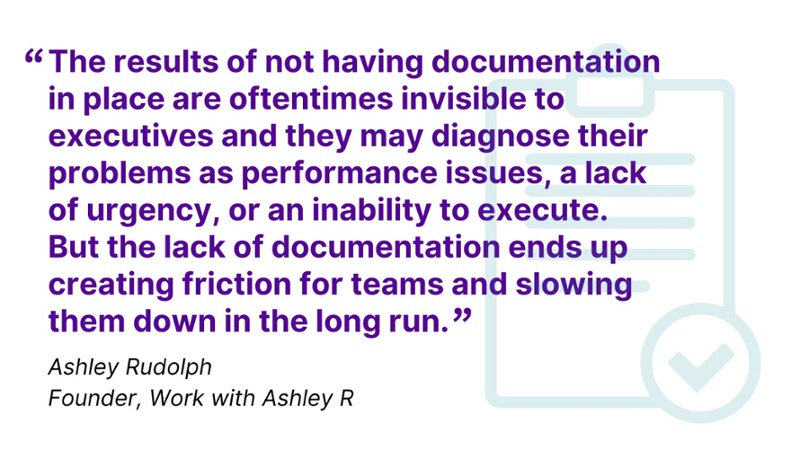
Chris and Kristen both started their response with a similar topic, that documentation is perceived as difficult or intimidating. This is likely because most companies don't do it, so most people don't know of an efficient and easy way to get started with this new habit.
"It's hard," Chris said. "Getting the process documented in the first place can take a lot of time and a lot of internal conflict. It's often something that crosses departmental silos, which causes friction, and because it's not a key part of anyone's role, it's easier to bury your head in the sand. Often the issue is not the original documentation but the fact that it doesn't get updated on a regular basis and people stop trusting or referring to it, at which point it becomes something of a white elephant," he said.
Kristen said, "Documentation can be INTIMIDATING! Scaling teams are busy, and perceived time commitment makes it hard to envision how this initiative fits into that landscape. Documentation is also much more streamlined with a central point of contact to handle logistics and provide accountability. An operations resource can outline documentation types / scope / format, divide the work, and provide tools / train the team. Teams often lack this people resource and may not know where to begin."
Adam spoke about the difference in the perception of documentation's benefits vs. time costs. "Documentation efforts can often be shifted to the back burner because they can be perceived as efforts that don’t directly drive revenue or save costs. On the surface, documentation efforts could be seen as activities to prevent the negative consequences of a potential scenario that may never come. However, if you dig deeper and find ways to tie your documentation efforts to quantifiable outcomes or impacts, you may find a greater desire for your organization to follow through on documentation and keep it closer to the front burner of priorities. For example, perhaps you are able to show that documentation has enabled your onboarding process to activate new employees X days faster than before which is a cost savings of $X. Or perhaps by documenting or templating stages of your sales process, you’ve been able to improve deal velocity by shortening the length of your sales cycle," he said.
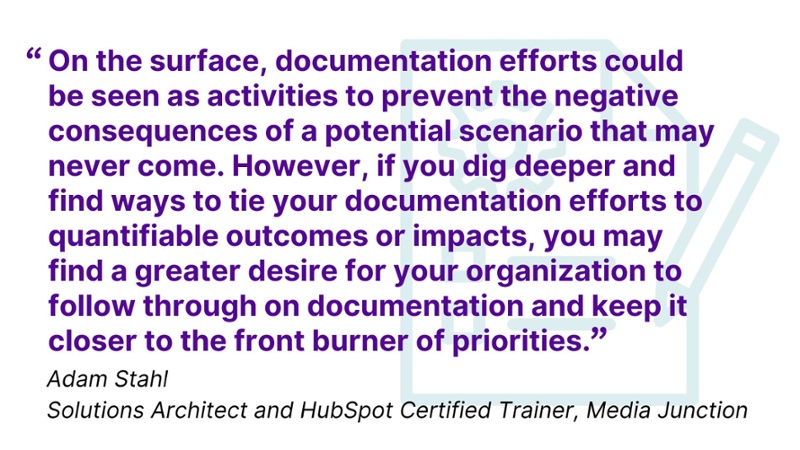
Asana writes about some potential or perceived disadvantages of documentation, and Jared Chaffee writes a blog on Medium premium for anyone who thinks documentation is futile.
Is internal process documentation more important than customer-facing product/technical documentation?
The experts agreed that both are equally important for different reasons, though one may be created before the other.
Chris explained they are both part of the same overarching process, and his teammate Hannah agreed both were equally crucial. For customers, "Clear guides enhance the user experience, empower customers to troubleshoot problems independently, and drive product adoption," Hannah said. "Internal process documentation is super important for keeping things smooth inside the company. It helps maintain operational efficiency, makes onboarding and training a breeze, and sets the stage for continuous improvement by identifying areas for enhancement. Striking a balance between these two types of documentation is key, ensuring your internal operations are on point while delivering a top-notch experience for your customers," Hannah continued.
Kristen explain how they were equally important, but there is a hierarchy or order of operations involved. "Internal process documentation needs to be clear before there can be equal clarity on customer-facing documentation. Teams must be aligned on the service or product and how it is delivered before it can be translated to language for public consumption."
Randi's response agreed with this process of creating these types of documentation in a certain order. "You must have your internal processes down before you can serve customers," she said. "Your internal processes will somewhat impact what you document for customers."
Personal / Individual reasons why documentation is important
How has documentation impacted your role or career?
Kristen explained how Proofpoint Marketing's growth accelerated the need for documentation, as well as the growth of her career from Account Manager to Director of Operations. "I entered the company as employee #3, and over time have seen the difference in operations B.D. (Before Documentation) and A.D. (After Documentation).
B.D. was filled with tribal knowledge, lack of clarity, and a lot of avoidable dialogue about execution / delivery--particularly between onboarding and an employee's first 6 months.
A.D. has a knowledge repository, consistent processes in our project management tool that are linked to documentation, and clear roles for regular updates and review. We spend time doing and refining.
A.D. is still a work in progress, but miles ahead of where we were just a year ago.
My role also transitioned over this course of time from Account Management to Operations. Spearheading the documentation initiative has helped me further understand not just the mechanics of what we do, but how every process flows into the overall success of the business as a whole," she said.
Randi explained how documentation accelerated her path and success in leadership. "My clinical background and documenting everything has made me a great GTM (go-to-market) leader. Why? Because I document everything, I can see where things went wrong (what needs to change) and what's working well (so don't mess with it). Iterating is a key process of 'process improvement' and I can always show PROGRESS to leadership because I document," she said.
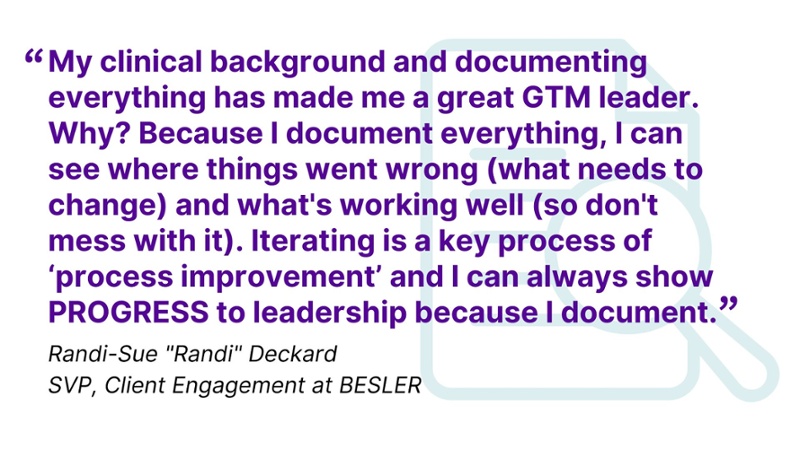
For people working on intricate technical challenges with different clients on a daily basis, documentation of each client's processes is exponentially important for success, in addition to documenting how to solve the common problems shared between clients. "I implement CRMs and fix broken HubSpot portals - lack of documentation is a huge challenge I face on a daily basis," Chris said.
"Lack of documentation, and also the knowledge on how to easily find and navigate it, has been stressful when starting new roles in the past," Hannah added, when reflecting on how documentation has impacted her role or career.
Documentation's importance for supported employee onboarding
On a similar note, when asked about how up-to-date and findable process documentation would make you feel when starting a new job, Hannah replied, "Being able to self-serve and find the relevant documentation to enable me to get to grips with a new role as quickly as possible, without having to and-raise too often would make me feel very supported and happy that I was joining a business that had its house in order."
Kristen explained, "Documentation is clarity and clarity is kindness. I would feel welcomed and assured."
And Randi simply replied, "Pinch me. Am I dreaming?!"
Read (or skim) this giant blog to learn how I used documentation as a part of a comprehensive onboarding program for my last company.
Important mental health effects of having or not having documentation
Randi explained the negative mental health effects of not having documentation. "A lack of up-to-date [documentation] can lead to confusion /indecision on how to act, which adds to stress."
Kristen's response agreed. "I've seen firsthand how lack of documentation creates stress, delays, and impacted ability meet delivery timelines. This is all the more acute in a remote work environment where it can be hard to cut through the virtual clutter to get the answers you need."
Having up-to-date documentation can create positive mental health benefits, as Hannah described. "It would definitely be a positive thing for my mental health, being able to quickly find answers and resolutions to things, feel part of a team because I understood what everyone is doing and following the process myself. It is a huge time saver too!" she said.
Hannah also explained how having hidden, non-findable documentation can cause stress, when asked to recall any mistakes that could have been prevented by having documentation. "Spending time writing up new documentation only to find there was documentation within the business in a role was stressful. Navigating to documentation is equally as important as creating it!" she said.
To read more about the mental health benefits documentation can provide, see this LinkedIn post from World Mental Health Day.
Problems when team members leave without documenting their processes
When asked about any pain felt when team members leave the company without documenting their knowledge, the experts agreed this is a big source of stress.
"It is stressful and time-consuming trying to unravel what came before, and often leads to wasted time," Hannah said.
Kristen explained, "The worst thing about operating with tribal knowledge is a member of the tribe leaving. That scenario can often mean filling a knowledge gap, training from scratch, an obvious and less-than-ideal learning curve (particularly for anyone who is client-facing), and a large internal time investment. It is stressful."
Company-level reasons why documentation is important
How has your company benefited from having documentation?
"At a commercial lab startup, I was the first Strategic Account Manager assigned to a single large account. I created my process and documented as I went along. After the first year, due to the success (exceeded revenue expectations), I was asked if I could teach and lead a team to do the same thing with multiple accounts. If I hadn't documented, it would have been difficult to build the team, onboard, and train them," Randi said.
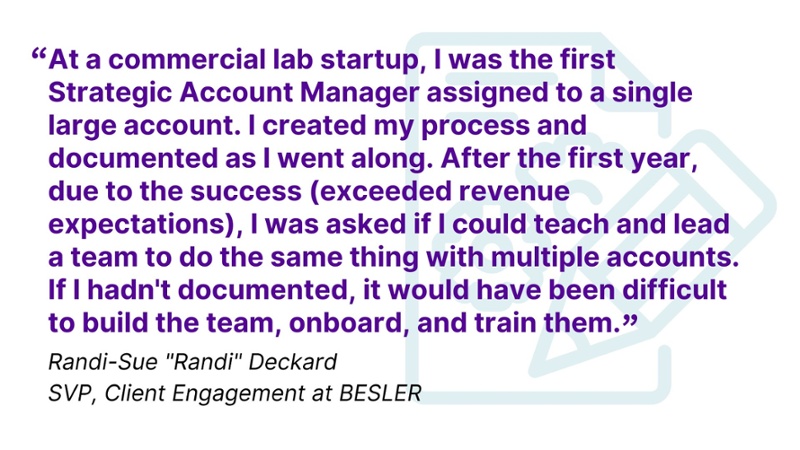
Bringing the discussion back to employee onboarding, Hannah said, "A detailed onboarding manual and process documentation significantly reduced the time it took for new hires to become fully productive. They can independently refer to documented processes, leading to faster integration into their roles."
When asked to describe some of the measurable results of having documentation, Hannah continued, "[The new employees] can independently refer to documented processes, leading to faster integration into their roles." Feedback from team members reinforced this result, Hannah said. "{Documentation] empowered them to self-serve and boosted their confidence in being able to fulfill their job requirements."
Kristen explained the benefits her agency has seen in the previous blog as well as above in the description of the Before Documentation (B.D) time and After Documentation (A.D.) times.
When discussing measurable results, Kristen explained how the project management system has allowed her to measure the success of implementing documentation and operationalizing processes. "Delivery roles consistently hit time estimates for assigned tasks; delivery margin is healthy and consistent month-over-month. [We also] significantly reduced Q&A dialogue happening in Slack and meetings to resolve questions about delivery," she said.
If you're wondering what size of company could benefit the most from process documentation, Hannah said, "The bigger the company, the bigger the importance of documentation, as there are more people to 'go rogue' if they are unsure of the processes."
Company culture benefits
The company culture benefits of having documentation were another key point that Kristen discussed. "Our people-first culture empowers our team to build a schedule that adapts to the ever-changing demands of work and life, while focusing on high-level output--not time sitting at a desk. As a fully remote, distributed, and flexible company, we provide the tools and support to work wherever, without sacrificing connection to the team or priorities outside of work," she said.
"The linchpin in all of this is documentation," Kristen continued. "Documentation is the knowledge and freedom to complete the work wherever, whenever, with a high degree of excellence."
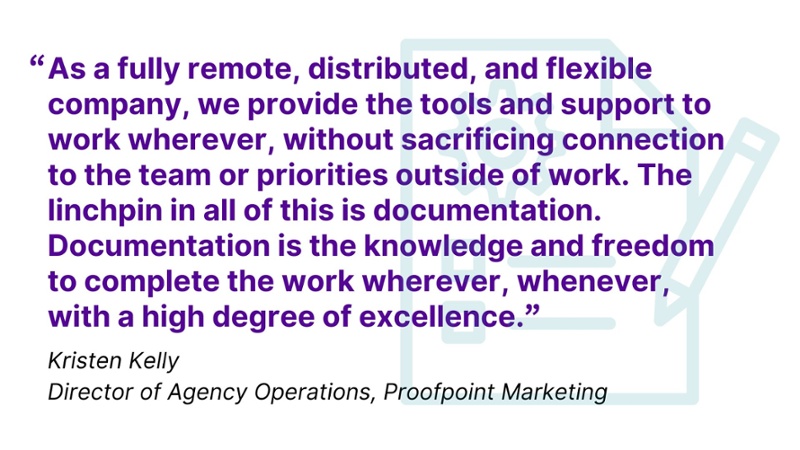
Quality control benefits
Speaking of excellence, Kristen also wrote about how quality control is a reason why documentation is important at a company level. "Documentation has most effectively improved consistency of deliverable inputs and deliverable format. Managers spend less time reviewing for consistency and more time reviewing for strategy and content," she said.
Atlassian's blog also discusses documentation's importance in quality control.
More employee onboarding benefits
When asked specifically if process documentation is helpful for creating and running an employee onboarding program, Hannah said, "Process documentation is vital for employee onboarding. It provides clear and consistent guidelines, saves time by streamlining tasks, ensures essential resources are easily accessible, facilitates task delegation, supports continuous improvement, and ensures compliance with legal requirements. Overall, it contributes to a smoother, more efficient, and compliant onboarding experience for new employees."
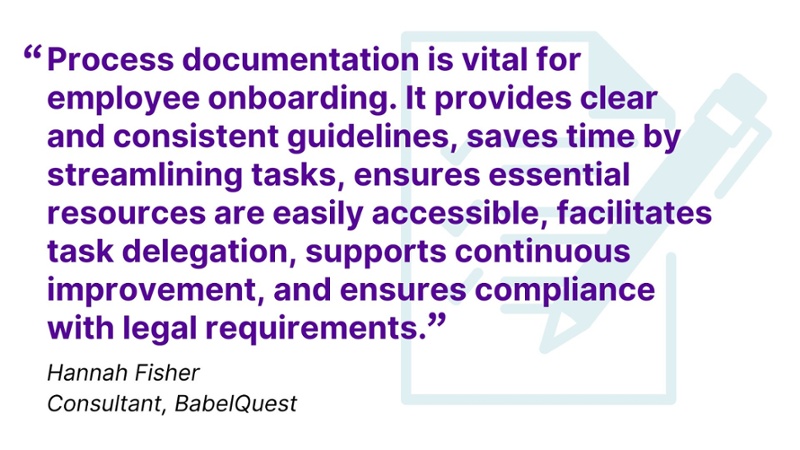
Kristen responded, "Documentation allows for onboarding to be consistent, modular, and repeatable. Individuals also learn differently, and documentation allows for a mix of synchronous and guided asynchronous learning."
Speaking of asynchronous work, another survey question asked if process documentation was more important for remote and/or asynchronous companies. Hannah explained, "Documentation allows for onboarding to be consistent, modular, and repeatable. Individuals also learn differently, and documentation allows for a mix of synch and guided asynchronous learning."
Conclusion
Now that you're armed with plenty of reasons why documentation is important, from many different angles, what are you waiting for? Go forth and document! 😄 Today is the best day to start documenting your processes!
Thanks so much to the expert contributors for this article: Chris, Hannah, Kristen, Randi, Ashley, and Adam!
If you’d like to contribute to future articles, sign up for the mailing list below to be alerted of the next chance!
Additional resources to learn about documentation's importance:
- Read a comprehensive guide for documenting your business processes, from the content in my course
- If you'd like to learn more about the importance of healthcare documentation, watch this short 4-minute video, or this video which could translate well to consultant and agency services.
- Forbes (which offers 4 free articles a month) featured one article on documentation's importance for success and one about tips to make it happen.
- It's no surprise that productivity software blogs talk about documentation! Read what Slack, Teamwork, WhatFix, Microsoft, and Scribe have to say about the importance of documentation.
- Processology explains 4 reasons why you should document your processes
- Vadim Kravcenko writes about the importance of documentation
Topics: Documentation



